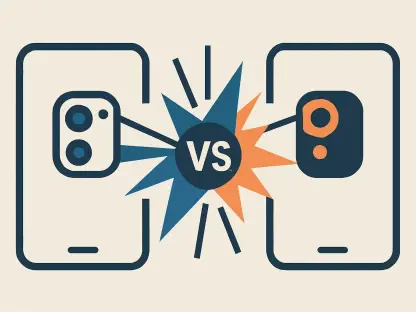During the TechCrunch Disrupt 2024, London-based technology company, Nothing, founded and led by Carl Pei, announced an intriguing possibility that could potentially reshape the smartphone market. With the global sphere largely dominated by Android and iOS, introducing a new mobile operating system poses significant challenges. However, Pei believes Nothing’s innovative ethos could bring fresh perspectives to the table and carve a niche in this duopolistic market. This ambitious move aims not only to differentiate Nothing but also to create a new and lucrative source of revenue.
The Current Market Landscape
Overcoming the Duopoly of Android and iOS
Within the current smartphone ecosystem, Google’s Android and Apple’s iOS hold a tight grip on the market, making it daunting for new entrants to make a significant impact. Carl Pei highlighted the central role smartphones play in connecting individuals and accessing information across the globe. The dominance of these two operating systems diminishes the choices available to consumers, creating a stagnant environment in terms of user experience innovation and technological advancements. Pei pointed out that while both platforms have their strengths, the limited competition leads to a lack of diversity in available options, keeping users confined within rigid ecosystems.
Nothing aims to break through these substantial barriers by developing a proprietary mobile OS that could potentially shift market dynamics. By enhancing the user experience, Nothing could attract a dedicated user base that values innovation and customization, aspects that seem to have plateaued within the current duopoly. The introduction of a new OS would inherently bring more options to consumers, potentially driving both established and new players to further innovate. This disrupts the norm, which benefits the industry and the end-users.
Leveraging AI for a Superior User Experience
A primary aspect of Pei’s vision for a new OS revolves around leveraging artificial intelligence to significantly enhance the user experience. Pei acknowledged the avenues previously explored by companies like Huawei with Harmony OS, illustrating that venturing into this territory is no easy feat. However, he emphasized that the burgeoning capabilities of AI present opportunities that were not feasible before. AI could enable unprecedented customization levels and augmentations tailored to individual preferences, a feature missing in current platforms. By focusing on these advanced AI capabilities, Nothing’s OS could offer a more intuitive, user-friendly interface that sets it apart from the competition.
Pei insisted that the goal is not to delve into foundational aspects like building drivers or kernels, but to maximize the value derived from technologies like AI to enhance user satisfaction. This strategic use of AI differs significantly from foundational research, aligning with Nothing’s goal of creating an exceptional product rather than merely advancing technology for its own sake. The intention is to use AI pragmatically, focusing on relevant applications that directly benefit the end-user, making their interaction with the device more seamless and satisfying.
The Business Potential of a New OS
Revenue and Market Impact
Carl Pei emphasized that a proprietary OS goes beyond merely enhancing the user experience; it opens new business avenues for Nothing. By having a unique operating system, the company can achieve better business margins compared to solely focusing on hardware. A new OS offers various monetization opportunities, such as app stores, services, and other potential software-based revenue streams. These avenues could prove more lucrative than hardware sales, which often have slimmer margins and higher production costs. This approach not only stabilizes the company’s financial health but also ensures a sustainable model that can be expanded and built upon.
Furthermore, by targeting a more integrated user experience across hardware and software, Nothing could create a more cohesive and seamless ecosystem. This integration can inspire brand loyalty and attract consumers looking for a more harmonious technological environment, thus amplifying Nothing’s market presence. By penetrating the software market, Nothing can diversify its portfolio and reduce dependence on hardware sales. This strategic move aligns with overcoming the constraints imposed by the existing duopoly and fostering a competitive landscape that benefits both the industry and consumers.
Strategic Implementation and Challenges
The practicalities of developing a new OS are fraught with substantial challenges and risks. Carl Pei has yet to confirm whether external funding will be sought for this ambitious project. The high costs and resources required for such development could depend heavily on strategic partnerships and investments. Pei made it clear that the focus should be on applied AI rather than the foundational research commonly associated with creating large language models. This concentration on applied AI aligns with Nothing’s goal to develop a product-centric approach that elevates user satisfaction rather than solely gaining technological ground.
While the current technological landscape offers potential for growth, the challenges of entering a market dominated by established giants cannot be underestimated. Notwithstanding these obstacles, Pei remains optimistic about leveraging technological advancements to disrupt the status quo. As Nothing explores these possibilities, the company must navigate complex technical and market hurdles to make Pei’s vision a reality. Despite inherent risks, the prospect of producing a differentiated product that competes on user experience and advanced AI integration in a market primarily defined by Google and Apple remains a compelling consideration for Nothing.
Conclusion
At the TechCrunch Disrupt 2024 conference, a London-based technology company called Nothing, which was founded and is led by Carl Pei, made a significant announcement that could potentially transform the smartphone market. In an industry primarily ruled by Android and iOS operating systems, launching a new mobile OS presents substantial challenges. However, Pei is optimistic that Nothing’s dedication to innovation could introduce fresh perspectives and carve out a unique niche within this duopoly. This bold initiative not only seeks to set Nothing apart from its competitors but also aims to establish a new and profitable revenue stream. Pei envisions that by focusing on cutting-edge design and user experience, Nothing could offer something distinct from the entrenched players. This ambitious strategy could attract consumers who are looking for alternatives to the existing dominant platforms and could result in Nothing becoming a significant contender in the global smartphone market. By pushing the boundaries of what is possible, Nothing hopes to inspire a shift in the industry landscape.









